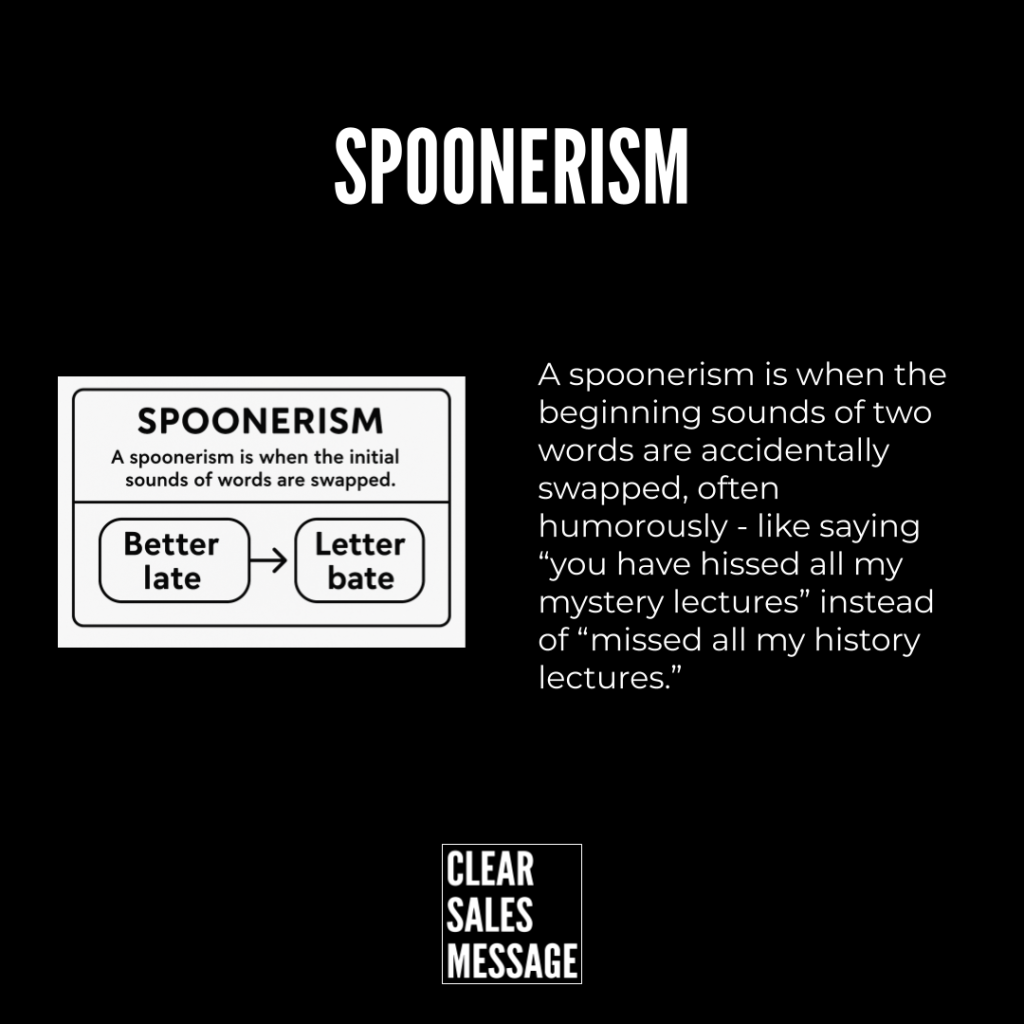Understand Your Buyer > Wordplay > Spoonerism
What is a Spoonerism?
A spoonerism is when the first sounds or letters of two words are accidentally swapped, often with funny or unexpected results.
They’re named after Reverend William Spooner, who was famously prone to mixing up his words in this way. Whether he actually said all the classics is debated, but his name stuck.
Here are some well-known examples:
-
“You have hissed all my mystery lectures” (instead of missed all my history lectures)
-
“It’s roaring with pain” (instead of pouring with rain)
-
“Better Nate than lever” (instead of better late than never)
-
“A lack of pies” (instead of a pack of lies)
Spoonerisms usually happen when someone is speaking quickly or nervously, but they can also be used intentionally for humour or effect.
Why Do Spoonerisms Work?
Spoonerisms are amusing because they take something familiar and twist it in a way that catches the ear.
They work because:
-
They’re playful. Swapping sounds makes language feel more fun.
-
They’re surprising. The listener expects one thing and hears another.
-
They’re memorable. That mental glitch sticks with people and often gets a laugh.
Even when accidental, spoonerisms give your speech personality. When used on purpose, they can become a clever tool.
How Can You Use Spoonerisms?
You can use spoonerisms to inject humour, break the ice, or create clever wordplay in your writing or speech.
In Comedy or Conversation
Spoonerisms are great for making people laugh:
-
“Is it customary to cuss the bride?”
-
“The Lord is a shoving leopard”
-
“You’re occupewing my pie”
They’re perfect for characters, dialogue, or public speaking moments where a bit of levity is welcome.
In Branding or Content
When used creatively, spoonerisms can help a name or slogan stand out:
-
“Snack to the futcher” for a retro food campaign
-
“Get bussed and flrilliant” for a playful product launch
They’re unexpected, which makes them effective at grabbing attention.
In Language Learning or Wordplay
Spoonerisms are also useful in teaching sound patterns or showing how small changes in speech affect meaning. They demonstrate the power of phonetics in a fun, low-stakes way.
In Summary
A spoonerism is a swap of initial sounds that turns a normal phrase into something twisted and memorable. Sometimes it’s a slip of the tongue. Sometimes it’s a clever trick.
Either way, it reminds us that language isn’t just about what we say — it’s also about how it sounds. If you want to add a touch of wit or warmth to your words, a spoonerism might be just the twist you need.

Like this kind of stuff? Want more?
Then Practical Sales Training™ is for you…
Action focussed, affordable sales training
for entrepreneurs and small business owners.
Brought to you by James Newell
